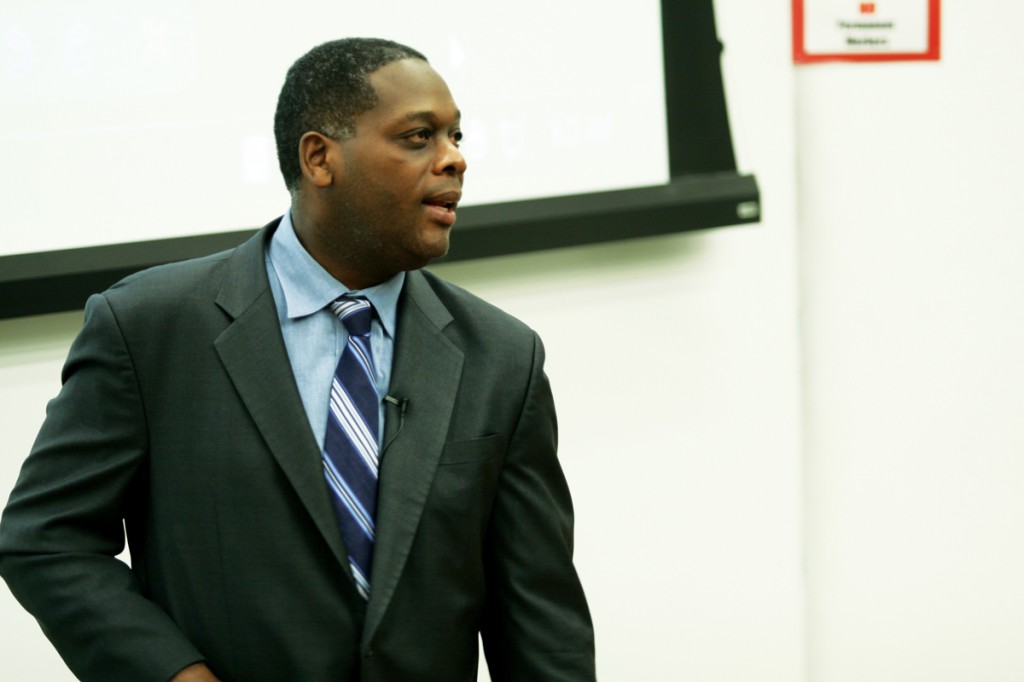By Nicholas Bostick
Managing Editor

As part of Brookhaven College’s Social Science Lecture series, Dallas County District Attorney Craig Watkins was invited to speak to students. His talk, “Guilty Until Proven Innocent: Reforming the System,” was centered on the involvement of the Innocence Project in Texas’ criminal justice system.
The Innocence Project is an organization dedicated to helping wrongly convicted individuals that also works to prevent wrongful convictions in the future.
The talk was held at 9 a.m. on March 20. Students filled every seat of Room B240 in anticipation of Watkins’ visit.
“As a DA [District Attorney] my goal is to seek justice,” Watkins said. “If a person is claiming they’re innocent, and it is proven to be true, then that person is let out of jail … if it turns out that they are not [innocent], then they stay in jail.”
In 2007, Watkins persuaded county officials to fund the creation of the Conviction Integrity Unit, according to the Dallas County District Attorney’s office website. “We proactively look at these claims of innocence,” Watkins told students. “They [the Innocence Project] are advocating for their client, be it innocent or guilty. We are advocating for the citizens of Dallas County.”
Since 2001, 24 men have been exonerated after wrongful convictions in Dallas County alone, according to innocenceproject.org.
Watkins talked about the inherent flaws in the criminal justice system. He brought up issues such as eyewitness misidentification, faulty investigative techniques and racism.
“Most of the people that we find that are wrongly convicted happen to be people of color,” Watkins said. “That is a conversation we need to have in order to fix our criminal justice system.” As of September 2013, a little more than 68 percent of Texas’ then 163,990 inmates were minorities. Almost 50,000 crimes leading to convictions were committed in Dallas County alone, according to texastribune.org.
Watkins said that even when people who are wrongfully convicted are exonerated, the process of reintegration is a major roadblock.
Watkins gave an example of these issues by telling students about one man who was released after being wrong- fully convicted. “Here is a guy who spent 27 years in prison for a crime he didn’t commit. He gets out, and we try to make it right by compensating him, but there are still issues that he has mentally because of his incarceration,” Watkins said. “That is just so unfair.”
The man was arrested several times after his release for drug-related offenses. He died in jail after his last arrest just before he was to be transferred to a rehabilitation facility, Watkins said.
The solution to these issues, Watkins said, is to focus on giving inmates, both wrong- fully and justly convicted, proper rehabilitation.
“From a criminal justice standpoint, you should probably look at, ‘How can we make sure we’re not convicting people wrongfully,’” Watkins said. “From the psychological standpoint, you probably should be looking at, ‘When we do convict a person right- fully and they spend time in prison, what do we do to make sure that they are healthy and equipped to come back into society when their sentence is done?’”
During the question-and- answer portion of the talk, Watkins also discussed the need to re-evaluate the way certain drug offenses are punished. “I think if we look at our drug policy overall, we can decrease the [number] of folks that are in prison by 75 per- cent,” Watkins said regarding the legalization of marijuana.
Brookhaven business student Jared Hall said he enjoyed the talk. “I thought he made some good points, but there were certain questions that were asked that he kind of tiptoed around and didn’t get to the meat of the answer,” Hall said.
“It was good that local government came out and visited the school and gave students an opportunity to ask questions,” Benedict Uroda, a Brookhaven faculty member in the Social Sciences Division, said. “It was great that the district attorney came out and talked to all the students, regardless of the students’ opinion on the nature of what [Watkins] had to say.”






